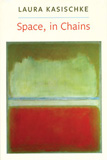January 15, 2012SPACE, IN CHAINS
Review by Nick DePascal 
Copper Canyon Press
PO Box 271
Port Townsend WA 98368
IBSN 978-1-55659-333-8
2011, 110 pp., $16.00
www.coppercanyonpress.org
Space, in Chains, Laura Kasischke’s eighth book of poetry, is a powerful and stripped collection that presents a picture of grief, less through proclamations and statements than through striking, disturbing and original imagery. While the individual poems mostly come off feeling gloriously bare-boned and raw, at 110 pages the collection itself at times can feel a bit overstuffed and redundant.
Space, in Chains mostly works in the mode of multiplicity, and like a house of mirrors it displays its subjects from a variety of different angles and possibilities, often within a single poem. Through the multitude of possibilities offered, the reader is invited to engage with the various meanings and images used, to expand their own understanding of the subjects discussed, and in a way allowed to “choose their own adventure,” as we in the real world are never allowed. This theme of multiplicity is set from the opening poem “O elegant giant,” where we get a description of the speaker’s father, presumably suffering from Alzheimer’s:
And Jehovah. And Alzheimer. And a diamond of extraordinary size on the
hand of a starving child. The quiet mob in a vacant lot. My father asleep in a
chair in a warm corridor. While his boat, the Unsinkable, sits at the bottom
of the ocean. While his boat, the Unsinkable, waits marooned on the shore.
While his boat, the Unsinkable, sails on, sails on.
Here, the speaker imagines the father as every child growing up does: “Unsinkable,” or invincible, made even more poignant by the obvious devastation patients of Alzheimer’s and their families face. And the speaker, through the metaphor of the father’s ship, tries to picture the outcome of the disease, first simply as death, then as absence, and finally as absence with possibility, the ship sailing on without the speaker, but at least still sailing on.
As in “O elegant giant,” the worlds in Kasischke’s poems are often presented as mysteries and riddles, and what’s pleasing about the poems is that the speakers seem content to catalogue—both the objects of the world and their memory of it—rather than explain or answer those mysteries. Thus, the multiplicity presented in the poems seems to say, “who are we to demand answers?” And this unconcern for finding answers paired with the use of varied images actually allows Kasischke to approach her subjects from a place closer to truth and devoid of clichés. Take, for example, “The drinking couple, similes,” a poem that announces in its title its intent to use an incredible number of similes to try and get at that mysterious combination of freedom and looseness and passion that alcohol instills people. Rather than try and use an extended metaphor throughout the poem to capture this feeling, the speaker’s description attacks from all sides:
until the next drink
like a princess waking up
beside a chimpanzee—or that chimpanzee
in a tuxedo, strappedto a rocket, launched
in a living room, likenot the strong man’s arm, just
the sleeve, as ifnot only the birds but the cages
had been set free, the way wewere enjoying one another
enjoying one another’scompany
The poem here, like that rocket, blasts the reader through at breakneck speed with short lines and little punctuation, but with an interesting if divergent image in each line so that the images seem to transform before the reader’s eyes. The images themselves are striking, yet tangible, and this allows the reader to grasp each before moving on to the next. That morphing quality of the images seems to accurately represent the situation of the poem without precisely defining or explaining it, a feature of many of Kasischke’s poems, that again, gives the reader agency as they read.
If there is an issue with the collection, it’s that there are simply too many poems. While many of the poems in Kasischke’s collection are incredibly powerful and original, it’s the strength of these that call attention to some of the weaker poems. For example, in the poem “Forgiveness,” we get the lines “Hello, floating multitude of my sins in a / basket called Forgiveness on an ocean the name of which my son once mis- / pronounced the Specific.” Whereas in the majority of poems the reader is given vivid and surprising images, the flatness and generalizations of this poem feel dull by comparison, and there are others with similar problems. It’s certainly not that these poems are bad by any means, only that they feel ineffective in the context of the other poems in the collection.
But this particular criticism or gripe doesn’t detract from the fact that the collection is an eminently enjoyable read, one that offers clarity through Kasischke’s tightly controlled language and imagery, while at the same time offering readers fresh perspectives in her willingness to embrace multiplicity and abundance.